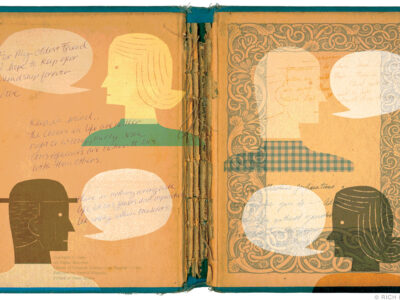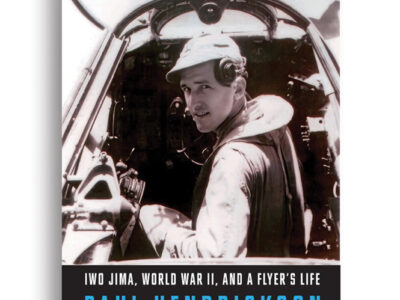By Susan Frith
He calls them the “Chest Hair Dialogues.” It’s what men talk about in the locker room when their wives aren’t around, explains Stephen Fried, author of a new collection of essays titled Husbandry: Sex, Love, and Dirty Laundry—Inside the Minds of Married Men. “Maybe nudity humbles us, because there’s no hiding how far we’ve strayed from Michelangelo’s David-like perfection, and at the same time it frees us … There’s a terrycloth truth about these discussions that you just can’t get anywhere else.”

HUSBANDRY:
Sex, Love, and Dirty Laundry — Inside the Minds of Married Men
Stephen Fried C’79.
Bantam Books, 2007. $18.00.
Those talks may be a mystery to their spouses, but Fried sportingly gives his readers a guest pass to the locker room and to his marriage of more than two decades.
He does so with witty observations and not nearly as much bravado as one might expect at the half-court basketball game. Fried admits, for example, that their sex life fluctuates like the Dow: “It’s a myth that the frequency only slides downward (with age). This year’s sex earnings have been higher than last year’s.”
In a piece about jealousy, Fried fesses up to a ridiculous, if temporary, suspicion that his wife was having an affair with an algae researcher. In another he explains why he’s not willing to say, with a straight face, Yes, dear: “I think these are without a doubt the two most passive-aggressive words in the entire marital lexicon.”
Fried is a journalist who has exposed dangers in the prescription-drug industry in Bitter Pills [“Off the Shelf,” June 1998]; explored a supermodel’s life and tragic death in Thing of Beauty; and woven his own spiritual journey and personal grief into the story of a Jewish congregation seeking a new spiritual leader in The New Rabbi [“Coming to Terms,” Sept|Oct 2002]. In comparison, Husbandry is much lighter fare and reflects its origins as a series of short essays written for Ladies’ Home Journal.
I did find myself longing for more detours off the top 10 list of marital conflicts. Much has already been written on toilet-seat etiquette, laundry pileups, (remote) control issues, and sports widowhood. (A chapter on membership in “the Dead Fathers Society,” and the ways that the death of a parent can challenge a marriage, came closer to exploring new ground.)
Still, Fried’s assured prose and honest portrayal of a relationship filled with equal parts argument, ogling, and appreciation rescue most of these pieces from blandness.
In “She’s Such a Good Sport,” he describes the surprise gift of his wife becoming a passionate basketball fan: “I’ll never forget the first time she leapt into my arms after Allen Iverson made a buzzer-beater to win a game: I swung her back and forth and found myself in a whole new kind of love.”
Even his locker-room account contains a nice twist at the end: An acquaintance—upon hearing that Fried’s wife is out of town—warns him not to “do anything stupid … It’s not worth it. Believe me, I know.” Fried was so touched that he “temporarily suspended … the rules of naked guy privilege” to share this with her.
If many of the essays fail to venture beyond the familiar borders of dirty socks and holiday gift dilemmas, their small effects add up to a more satisfying whole—kind of like a good marriage.

HOW TO FEEL MANLY IN A MINIVAN:
The Desperate Dad’s Survival Guide
Craig Boreth C’91.
St. Martin’s Griffin, 2007. $12.95.
Missing from Fried’s book are one potential source of marital angst and pleasure: children. Craig Boreth’s How to Feel Manly in a Minivan: The Desperate Dad’s Survival Guide, is designed to help fathers through nine months of waiting (see “How to Be Useless”) as well as that whirlwind first year with baby.
Just a few decades ago, American dads would be safely ensconced in the waiting room while the messy business of birthing took place a few doors down. Today, reflecting an era in which men are expected to show up in full coaching-mode on labor day and perform a good share of infant-care afterward, there is a spate of books and videos on the role of fatherhood. They range from the serious to the silly. A number of the latter variety, including Boreth’s,seem to express a similar theme: Dad doesn’t have a clue.
I’m always a little skeptical of such blanket characterizations. When our own daughter was born, for example, my husband had more diaper-changing experience than I did from babysitting for friends during his bachelor days.
But I do think that a little gallows (or changing-table) humor can be a therapeutic thing for sleep-deprived parents, and Boreth comes through with a humorous system of baby bottles and beer bottles to denote how difficult and rewarding various tasks are (“How to Stay Sane When Flying With a Baby,” for example, rates three Baby Bottles and two Beers). He also manages to sneak in some fairly useful advice, pointing out wisely that Boudreaux Butt Paste is the best diaper cream, offering tips on getting fit for fatherhood (dads get backaches, too), and including recipes for virgin cocktails to join the mother-to-be in her abstinence. Finally, while there is a wealth of information out there on babyproofing your home for the safety of the infant, Boreth addresses a different, if related concern: how to protect your electronic equipment from destruction by the crawling set.
Boreth has certain favorite topics, and his frequent comments about baby farts and pregnancy’s enhancement of the female anatomy (I believe he uses the term major league yabbos) do get a bit tiresome. But in the end he leaves readers with one overarching message that I believe most veteran dads—and moms—would attest to: This is a year not to miss.

THE ESCAPE ARTISTS:
True Stories of People Who Turned Their Obsessions into Professions
Joshua Piven C’93.
McGraw-Hill, 2007. $14.95.
No one would deny that parenthood is an adventure, but Joshua Piven profiles individuals who have chosen more daring paths—with careers that take them to mountain peaks, under the Big Top, and onto the turfs of drug dealers.
In The Escape Artists: True Stories of People Who Turned Their Obsessions Into Professions, Piven plays upon a common fantasy of leaving behind the safe office job to pursue less predictable work. To prepare this book Piven got in touch with 10 of the people he had interviewed for his entries in the entertaining series of Worst-Case Scenario handbooks [“Best-Case Scenario,” Jan|Feb 2005]. (Those books posed, and answered with the help of various experts, such heart-racing questions as What to do when your car falls into a river and you’re inside it?)
Though Piven faithfully records their life stories, sometimes I felt bogged down with information that was, well, pretty ordinary. His chapter on DEA agent Steve Smith opens promisingly with a man carrying 10 kilos of heroin down an elevator, but then meanders through the subject’s earlier careers in the Marines and big business, only giving us the briefest of glimpses into the subject’s most recent work nabbing drug kingpins.
Part of the problem may be that in the challenge of occupying shelf space between entertainment and career-advice books, the strengths of each genre are slightly diluted: “There won’t be any ‘Seven Rules of Highly Effective Clowns,’” Piven writes. “My hope is that after you put this book down, you’ll have at least some new perspectives on what can happen when you pursue your passion.”
Those moments are tucked into the book. My attention was captivated by the account of rafting guide Bridget Crocker’s encounter with the Kalinga villagers of the Philippines, who have “mostly abandoned” the ritual of headhunting but still test her intelligence—and nerves—with the offer of a dead piglet, and by Piven’s description of the afternoon that surfer Jack Viorel got lost in the fog in shark-infested waters: “Was he paddling toward shore or out to sea? Were the voices he heard in front of him or behind him? As the last of the daylight faded, Jack knew he was in trouble.”
Piven is right to point out that even the most exciting careers have low and high points. He entertainingly describes Karen DeSanto’s disastrous first clowning gig (think sticky makeup, lots of gnats, and a group of bored kids at a birthday party). But rather than get an obligatory rundown of the rest of her resume, I would have rather spent more time kicking back after hours with the troupe on the circus train.
Piven’s book works best when he takes readers directly to the action, so we feel that we, too, are part of the adventure, immersed in a more vivid reality than our own. DEA agent Steve Smith tells the author, “I’m not doing anything other than making sure that a few people don’t get too rich in South America.” He then adds, “It’s still a hell of a lot of fun.”
Maybe so. I just want to be in on it.
Susan Frith, former Gazette associate editor, is a freelance writer in Orlando. She is expecting her second child this month and is trying to read fewer baby-advice books this time around.




